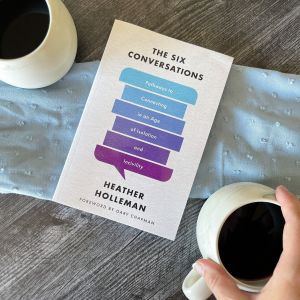- Tags:
- Rob Eyman
- prayer
- questions
- repent
- simplicity
Over the last few weeks I’ve deviated from my usual emphasis on scripture to look at soul-sustaining practices that can help us better listen to the Lord as we live in these uncertain times. So far I’ve been able to connect the practice to something we just read in the gospels, but that will need to change today. It is clear that Jesus practiced simplicity and, therefore, simplicity is something for His followers to know and practice as well. But what it is it really and how does it relate to the listening we’ve focused on for the last several weeks? Let’s start with where we are.
COVID-19. George Floyd. Protests. Riots. Financial pressures. Relational strain. Uncertainty about what to do. The list goes on. The stress we feel these days is real and it comes at us from all directions. While much of it is outside of our control, there is one source of stress that we can do something about.
In Revelation 3:20, Jesus expressed his desire for all Christians when He said, “Look! I stand at the door and knock. If you hear my voice and open the door, I will come in, and we will share a meal together as friends.” This verse is a beautiful picture of the closeness which our Lord wants to have with His people. Jesus initiates by knocking; we respond by opening the door. But in order to open the door, we first need to hear the knock.
Over the last few weeks, we’ve considered the importance of listening to Jesus and the role silence plays in helping us listen well. We saw how silence pushes back the barriers that keep us from hearing God speak to us, removing the stress-filled distractions that keep us from recognizing the Lord’s knock at life’s door. In this article we want to think about how practicing simplicity improves the silence and so enhances our ability to listen.
The spirit-sustaining practice of simplicity involves the conscious choice to reorder one’s life around a few consistent principles, holding on only to what is necessary to human well-being and casting off that which is not. Jesus speaks of simplicity in Matthew 6:33, “Seek first His kingdom and His righteousness, and all these [other] things will be yours as well.” Paul reveals his commitment to simplicity in Philippians 3:10. When referring to his many accomplishments and the things he could have continued pursuing he said, “I’ve dumped it all in the trash so that I could embrace Christ and be embraced by him...I’ve got my eye on the goal...I’m off running, and I’m not turning back” (The Message).

True simplicity is a matter of an inward order which allows us to deal with many complexities in life. Think of it, if seeking God’s kingdom really is our primary concern, or if we truly have “one thing we do,” then all other demands will find their proper place. Now, a simple life does not necessarily mean a life impoverished of activities or material goods. When it comes to the spiritual life, simplicity is not opposed to complexity. In fact, simplicity makes great complexity bearable for it focuses our thoughts and energies into those few consistent principles that are necessary to human well-being.
Ours is a land cluttered with options. Daily we are confronted by choices which scream for us to read this or do that. Daily we are bombarded by thousands of advertisements most of which are designed to make us discontented with our current circumstances and motivated to pursue something new. Living in such an environment distracts us from those few consistent purposes which allow us to hear the knock, open the door and enjoy His fellowship.
So, how can we clear out the clutter and reduce the complication? I recommend beginning with a few questions. Chuck Swindoll has excellent advice here.
All you need is some uninterrupted time to pray and reflect. Allow your relationships and responsibilities to slip from your mind as you consider your life before God. Consider His love for you and the fact that He made you for a purpose (Ephesians 2:10). Read Ephesians 4:22-24. Consider each part of each verse and ask yourself if you have honestly been active in working out verse 24. Then slowly consider some of the following questions.
Questions about You
- 1. Is there something you must do about your time with God? Do you need to rearrange schedules to ensure you are seeking Him every day?
- 2. Have you become cluttered in your schedule? Do you need to say “no” more often or back out of something to which you have already said “yes”? It is easier to say “no” when you carry a compelling “yes.” What inside of you makes you want to say yes too quickly? Consider your consistent purposes and make them your standard for deciding when to say yes or no. (This is a unique time. COVID has already cleared the decks. What things do you want to bring back in? What do you leave out?)
- 3. Have you become cluttered in your person? Do you spend weekends moving stuff from one place to another or throwing things into a room before company arrives? How much is in your closet or garage? In the same way, is your mind filled with details you don’t need to carry? What needs to be cleaned out?
Questions about Relationships and Activities
- 1. Are the good things keeping you from the best? Are the fifteen good things you do keeping you from pursuing the two best?
- 2. Does the weight of debt keep you from experiencing personal and financial freedom? Have past choices and patterns of spending limited your current options to pursue the best?
- 3. Think back to last summer. Did your activities outside the home steal time from those within the home? What will your family remember twenty years from now, a hectic pace with constant activity, or warm relationships that had time to talk? Again, COVID has already cleared the decks. What things do you want to bring back in? What do you leave out?
I’m sure you could come up with your own questions, but these provide a good start to pursuing a simpler life and a more attentive listening. Much more could be said, but this is enough to get us started. Chuck Swindoll offers this summary:
"Living in simplicity does not mean stopping all activities and saying no all the time. But it does involve refusing to excuse any longer the clutter and complication that drains your time and energy. It’s reordering your life around nourishing priorities, quieting your heart so you can hear Jesus knocking, and let Him in."
How might this season of time at home and national unrest help you bring more simplicity into your life?
Learning and growing up in Jesus with you,

Rob






